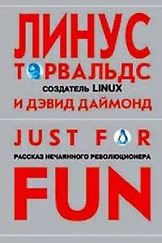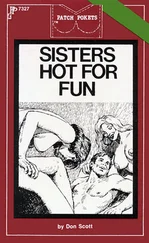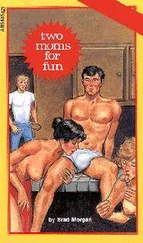Linus Torvalds - Just for Fun
Здесь есть возможность читать онлайн «Linus Torvalds - Just for Fun» весь текст электронной книги совершенно бесплатно (целиком полную версию без сокращений). В некоторых случаях можно слушать аудио, скачать через торрент в формате fb2 и присутствует краткое содержание. Город: NewYork, Год выпуска: 2001, ISBN: 2001, Издательство: HarperCollins Publishers, lnc., Жанр: Программирование, на английском языке. Описание произведения, (предисловие) а так же отзывы посетителей доступны на портале библиотеки ЛибКат.
- Название:Just for Fun
- Автор:
- Издательство:HarperCollins Publishers, lnc.
- Жанр:
- Год:2001
- Город:NewYork
- ISBN:0-06-662072-4
- Рейтинг книги:4 / 5. Голосов: 2
-
Избранное:Добавить в избранное
- Отзывы:
-
Ваша оценка:
- 80
- 1
- 2
- 3
- 4
- 5
Just for Fun: краткое содержание, описание и аннотация
Предлагаем к чтению аннотацию, описание, краткое содержание или предисловие (зависит от того, что написал сам автор книги «Just for Fun»). Если вы не нашли необходимую информацию о книге — напишите в комментариях, мы постараемся отыскать её.
Just for Fun — читать онлайн бесплатно полную книгу (весь текст) целиком
Ниже представлен текст книги, разбитый по страницам. Система сохранения места последней прочитанной страницы, позволяет с удобством читать онлайн бесплатно книгу «Just for Fun», без необходимости каждый раз заново искать на чём Вы остановились. Поставьте закладку, и сможете в любой момент перейти на страницу, на которой закончили чтение.
Интервал:
Закладка:
And I was very proud of it.
My sister Sara knew about my great personal accomplishment. I showed it to her and she looked at the screens of AAAAAAs and BBBBBBBB's for about five seconds; then she said "Good" and went away, unimpressed. I realized it didn't look like much. It's completely impossible to explain to somebody else that, while something may not look like much, a lot is going on in the background. It's about as impressive as showing somebody a stretch of road you've just filled in with tar. Probably the only other person who saw it was Lars, the other Swedish-speaking computer science major who started the same year I did.
It was March, maybe April, and if the snow was turning to slush on Petersgatan. I didn't know -- or much care. I was spending most of my time in a bathrobe, huddled over my unattractive new computer, with thick black window shades shielding me from the sunlight, not to mention the outside world. I was eeking out the monthly payments for my PC, which was scheduled to be paid off in three years. What I didn't know was that I would only be sending in payments for another year. By then, I would have written Linux, which would be seen by many more people than just Sara and Lars. By that time, Peter Anvin, who works with me now at Transmeta, would have started a collection on the Internet to get my computer paid off.
Everybody knew I wasn't making any money on Linux. People just started saying, Let's start a collection to payoff Linus's computer.
It was wonderful.
I had absolutely no money. I always felt it was important to not have asked for money or begged for money, but the fact that it was simply given to me was... I'm getting choked up.
That's how Linux got started. With my test programs turning into a terminal emulation package.
Red Herring magazine sends me to Finland to report on Oulu, the emerging high-tech center that is home to 141 startups despite its forbidding location a few hours' drive from the Arctic Circle. It's a good opportunity to hook up with Linus's parents and his sister, Sara, in Helsinki.
His father, Nils (who goes by the name N icke), meets me in the lobby of the Sokos Hotel Vaakuna, across the plaza from the Helsinki railway station. He is trim, wears thick glasses, bears Lenin's beard. He has recently ended his four-year assignment in Moscow for the Finnish Broadcasting Company and is now writing a book about Russia and deciding whether or not to take a post in Washington, a place he doesn't find interesting. Months earlier he had won a prestigious national journalism award, a commendation that his ex-wife Anna later would say "mellowed him considerably."
In the early evening he drives me in his Volvo V40 on a tour of Linus's snow-crusted neighborhoods, pointing out the solid building in which both father and son attended elementary school, driving past the grandparents' apartment where Linus lived in his first three months, and then the park-view building in which the family lived for the following seven years. Nicke had spent one of those years in Moscow studying to be a communist, when Linus was five years old. Next he points out the pale yellow apartment building in which Linus and his sister moved following the divorce -- a street-level adult video store has replaced the electronics supply store of Linus's youth -- and finally we drive past the most substantial of the structures, the five-story apartment block in which his maternal grandparents resided, the birthplace of Linux. Linus's mother, Anna, still lives there. This could be Manhattan's Upper East Side in late December.
Nicke is funny, smart, self-deprecating, and shares a host of gestures with his son, like the way he cradles his chin in his hand when he talks. They also share a grin. Unlike his son he is a lifelong athlete -- a socialist jock -- who plays on a basketball team, runs five miles a day, and has taken to swimming distances in an icy lake early each morning. Atfi fty-five, he walks with the athletic confidence of someone maybe two thirds his age. Another trait he does not share with Linus: Nicke seems to have had a complicated romantic life.
We have dinner in a bustling restaurant in central Helsinki where Nicke talks about the difficulty Linus had growing up as the son of an overactive communist who was a frequent public speaker and at one point held a minor public office. He explains that Linus was often teased about his father's radical politics, and that some parents even refused to let him play with their children. For that reason, explains Nicke, his son made a constant effort to distance himself from the left-wing rhetoric that was the backdrop of his childhood. "He wouldn't let me discuss it. He would leave the room," N icke says. "Or else he always made a point of having an opposing view. I know Linus was teased in school for having the wrong father. The message to me was, 'Don't put me in this awkward situation.' "
N icke drives me to his home, where he says we will drink beer in his kitchen. It is north of the central business district, in a collection of buildings that were originally built in the 1920s to house workers. We ascend the steps to his apartment and remove our shoes in the entry. The place recalls the late 1960s counterculture, with woven-basket lampshades, third-world wall hangings, houseplants. We sit at the kitchen table, where Nicke pours beer and we talk about fathering. "A parent shouldn't think that it is he who makes his children what they are," he says, reaching for his mobile phone to dial up the woman with whom he lives. He indicates that Linus is just starting to read the historical books he has been bugging him to read for years, and that Linus probably has never bothered to read his own grandfather's poetry.
I ask N icke if he has ever expressed an interest in programming, ever asked Linus to show him the fundamentals. He tells me he never has. Fathers and sons are unique individuals, he reasons, explaining that the act of delving into Linus's passion would be akin to "invading his soul." He seems comfortable in the role of father to a famous person. In a recent newspaper profile following his winning of the national journalism award, he was quoted assaying that, even in the days when he picked Linus up from the playground, other kids would point and say, "Look, there's Linus's father!"
Sara Torvalds has traveled by train from her home in a small city west of Helsinki, where the street signs are in Swedish first and Finnish second, and where she can afford an apartment with a claw-foot tub and sauna, and where, to her delight, Swedish -- not Finnish -- is heard on the streets. As she explains, she is in a minority within a minority: as a young adult she converted to Catholicism, an act that relegated her to the 10 percent of Finnish citizens who are non-Lutherans and caused her agnostic father to disown her for a matter of weeks.
Today she has traveled to Helsinki to teach catechism to youngsters under a government-sponsored program. She is pleasant and upbeat, and at twenty-nine she exudes the uncynical spirit of an earnest and busy high schooler. Her fair skin and round face give her a vague resemblance to her older brother, but it is obvious that she is naturally more sociable than he is. She regularly taps the keys of her mobile phone to send text messages to friends she will be meeting later in the day; then, just as frequently, she checks for replies. She has a successful translation business.
It is noon and Sara is taking me to meet her mother for lunch, with stops at various childhood locales: the cat park, the elementary school. "My parents were card-carrying communists, so that's how we were brought up -- to think the Soviet Union was a good thing. We visited Moscow," she explains. "What I remember most was the huge toy store they had, bigger than any thing in Helsinki." Her parents divorced when she was six. "I remember when we were told that Dad would be moving out for good. I thought, That's good. Now the fighting will stop. Actually, he had been going to Moscow for long periods, so we were used to him going away," she says. By the time she was ten, Sara opted to move in with her father, who had relocated to the neighboring city of Espoo, rather than live with her mother and Linus. "It wasn't that I didn't want to live with Mom. It was just that I didn't want to live with Linus. That way we would only fight on weekends. we fought all the time. Little by little, we fought less as we grew older. "
Читать дальшеИнтервал:
Закладка:
Похожие книги на «Just for Fun»
Представляем Вашему вниманию похожие книги на «Just for Fun» списком для выбора. Мы отобрали схожую по названию и смыслу литературу в надежде предоставить читателям больше вариантов отыскать новые, интересные, ещё непрочитанные произведения.
Обсуждение, отзывы о книге «Just for Fun» и просто собственные мнения читателей. Оставьте ваши комментарии, напишите, что Вы думаете о произведении, его смысле или главных героях. Укажите что конкретно понравилось, а что нет, и почему Вы так считаете.












